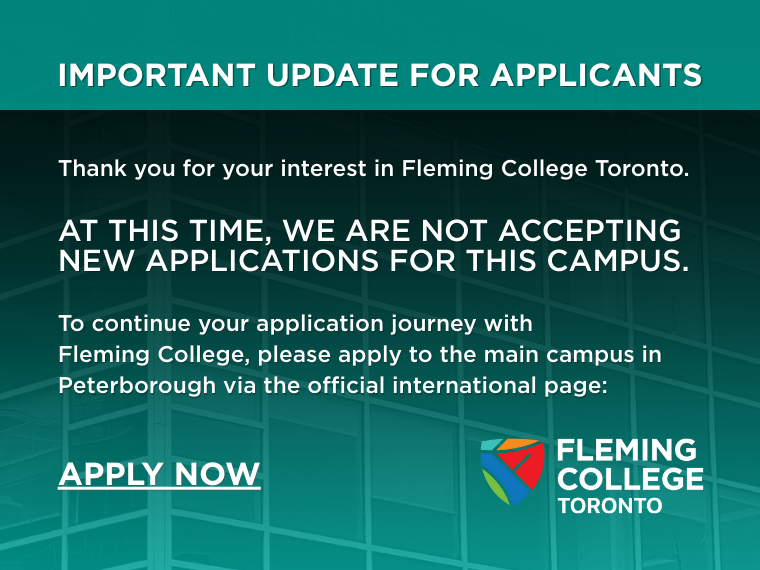In this one-year Personal Support Worker certificate program, gain the skills to start a fulfilling and in-demand career that puts people first. Learn through traditional lectures and innovative lab components, preparing you to thrive in a large range of healthcare settings or pursue further education.
-
Program Code:
-
PWT
-
Credential:
-
Certificate
-
Duration:
-
One Year
(two semesters)
-
Start Dates:
-
Fall (September),
Winter (January),
Spring (May)

Fees
| Semesters | Semester 1 | Semester 2 |
|---|---|---|
| Tuition | $8,125.00 | $8,125.00 |
| Ancillary Fees | $553.99 | $491.89 |
| Health Insurance | $700.00 | N/A |
| Semester Total | $9,378.99 | $8,616.89 |
| Total Program Fees | $17,995.88 | |
*Tuition and fees subject to changes.
*Health insurance is mandatory and non-refundable.
Scholarships and Awards:
Click here to learn more about entrance scholarships and awards.
Program Highlights
- Get approximately 400 hours of relevant theory and approximately 300 hours of real-life, clinical training.
- Benefit from innovative lab components throughout both semesters that simulate the work environment.
- Use supportive approaches and evidence-based practices to promote positive and safe behaviours in clients.
- Prepare to assist children, adults, and seniors with special needs or disabilities, and help them maximize life experience.

Why Choose Fleming College Toronto
- The program adheres to ministry guidelines, making it widely recognized by agencies and related employers.
- Learn in a supportive environment that values both the theoretical and practical sides of skill development in college education.
- Get access to an extensive suite of support services, such as career services, academic advising, housing and more.
- Enjoy the benefits of cosmopolitan life, including a thriving job market, cultural diversity, and networking opportunities.
- Class sizes that maximize personalized learning and peer interaction.
Minimum Admission Requirements
- Ontario Secondary School Certificate (OSSD) or equivalent. Please check the Ontario Secondary School Diploma Equivalency page for secondary education completed internationally.
- Gr 12 C English with 50% or above, or equivalent.
- Successful competition of Fleming College Toronto English Language Bridge Level 5 or provide IELTS Academic Overall 6.0 with no band score less than 5.5 or equivalent (students applying through the SDS stream must have an overall 6.0 with no band less than 6.0).
Applicants can also review the Languages Requirements page to understand and learn about the other options available to meet the program’s language requirements.
Non-Academic Requirements
- Your program has mandatory requirements which may include a criminal reference check, first aid, CPR-C, etc. For more information, please see the Non Academic Requirements page.
- Failure to provide any of the required Non Academic Field Requirements by the specified due date will result in an inability to participate in the mandatory placement components of the program.
Thank you and please give us a call if you need any clarification.
Technology Requirements
Students are required to have their own computer, internet access, webcam and microphone. Some required software applications are not available for MAC OS or Chromebook. Computer must be virtual machine capable. No tablets or Chromebooks for lab work. For this program, the following system specifications are required:
Microsoft Computer
Operating System: Windows 10
Processor: Core i5 – 1.6 GHz
Memory: 8 GB
Hard disk: 160 GB
Apple Computer
Operating System: MacOS 10.12
Processor: Core i5 – 6th Gen
Memory: 8 GB
Hard disk: 160 GB
Internet
Download speed: 2.5 Mbps
Upload speed: 3.0 Mbps

Career Opportunities
Upon graduation, you will be ready to offer care to patients and clients on your own or with a team of other healthcare professionals in a range of facility and community settings. Some options include:
- Long-term care facilities
- Group homes
- Private homes
- Hospitals
- Retirement homes
- Adult day centres
- Home care agencies
- Supportive housing
Program Courses
This course consists of a series of workshops that will prepare the student for his/her clinical placements and future employment opportunities. This course is also intended to support student learning and retention by preparing students for the academic demands of the Personal Support Worker Program.
Communications I is an introductory course that provides a foundation in college-level communications by teaching students to read critically, write appropriately for a variety of audiences, conduct and cite research, and revise for clarity and correctness. In seminars and labs, students will engage in both independent and collaborative activities, including the development of a digital portfolio designed to help them become more effective communicators in academic and professional environments.
This computer course introduces the student to computer basics and other technology. Through the extensive use of hands on activities, students will gain sufficient knowledge and experience to make productive use of computers as a tool in the college and workplace environments.
This introductory course provides an overview of the Personal Support Worker's role within the health care system. The role of the Personal Support Worker will be examined. Issues impacting the role such as accountability, interdisciplinary teamwork, legal and ethical rights and responsibilities, confidentiality, time management and the principles of documentation will be examined.
In this foundational course, the student will learn about the concepts involved in communication. Through reflection, the student will develop a deeper understanding of self and how self impacts communication with others. The student will explore the concepts of verbal messages, nonverbal messages, listening and responding through a variety of simulation activities that aims to support the development of core interpersonal skills essential for communicating as a health care professional.
This foundational course introduces the Personal Support Worker student to basic anatomy and physiology fundamental to the provision of personal care to individuals requiring assistance in an institutional setting. Attitudes, knowledge and skills required to function ethically, safely and competently will be addressed in this class. This course will discuss each body system, the common diseases associated with each system and their related interventions. Theoretical concepts and principles discussed in this lecture course will be applied in lab and clinical courses.
In this clinical placement, the student will demonstrate classroom theory and principles in the long term care setting. Students will also develop competence in therapeutic communication, professional behaviour and accountability, personal care interventions, observation, reporting and recording, promotion and maintenance of a safe environment, and participation as a multidisciplinary care team member.
Co-Requisites
- Computer Skills for PSW (COMP 583)
- Foundations for Personal Support Worker I (HLTH 244)
- PSW Skills Lab I (NRSG 201)
- PSW Applications and Interventions I (NRSG 200)
This foundational course introduces the Personal Support Worker student to practical skills fundamental to the provision of personal care to individuals requiring assistance in an institutional setting. Attitudes, knowledge and skills required to function ethically, safely and competently will be addressed in the lab. Simulated patient care situations, case studies and hands-on application of specific skills, will form the basis of this course.
Co-Requisites
- PSW Applications and Interventions I (NRSG 200)
Human development across the lifespan will be studied by exploring the interrelationship between biological, psychological and sociocultural influences from conception to end of life. Upon completion of the course, learners will have an understanding of individual development, in addition to the impact of lifespan development on families and communities. Learners will have the opportunity to follow an individual's development throughout the lifespan, using a variety of biopsychosocial factors.
This course introduces the student to knowledge required to safely and competently assist clients when taking medication, according to their plan of care. Students will be introduced to common drug classifications, expected outcomes and basic mathematics associated with medications. As well, students will learn about related legislation and the scope of practice and responsibilities of the Personal Support Worker (PSW).
Co-Requisites
- PSW Skills Labs II (NRSG 203)
This functional course will provide an overview of the Ontario Healthcare System. Students will examine the interdisciplinary role of healthcare professionals. Based on examination, students will dialogue about current issues and trends that impact the Ontario healthcare system, within the context of sustainability.
This foundational course provides an overview of the Personal Support Worker's role within the health care system. Using a variety of strategies such as problem solving, critical thinking and decision making, students will explore concepts such as legislation, quality improvement, food safety, alternative healing, lifelong learning, medication safety and other skills.
Co-Requisites
- PSW Skills Labs II (NRSG 203)
- PSW Applications and Interventions II (NRSG 232)
This introductory course combines two separate specialty areas; Palliative Care and Mental Health. Palliative focuses on developing comfort around dying and death. Using the Hospice Palliative Care Framework, students will explore the various domains of issues encountered by persons living with life-threatening illness, and identify strategies to address these issues to support the client and family at the end of life. Mental health provides a framework for understanding mental health issues. The student will learn about challenges experienced by individuals who are coping with mental health issues such as delirium, dementia, depression, abuse and other mental health disorders. The student will also explore best practice strategies for communicating with and caring for individuals and their families in a safe and respectful manner.
Co-Requisites
- PSW Applications and Interventions II (NRSG 232)
This foundational course builds upon the Applications & Interventions I. This course will continue to discuss body systems, the common diseases associated with each system and their related interventions. Attitudes and knowledge required to function ethically, safely and competently will continue to be addressed in this class. Theoretical concepts and principles discussed in this lecture course will be applied in lab and clinical courses.
This foundational course builds upon PSW Lab 1. The Personal Support Worker student will continue to develop attitudes, knowledge and skills required to function ethically, safely and competently in lab and clinical settings. Simulated patient care situations, case studies and hands-on application of specific skills will form the basis of this course.
Co-Requisites
- PSW Applications and Interventions II (NRSG 232)
- Assisting with Medications (NRSG 233
In this clinical placement, the student will continue to demonstrate classroom theory and principles in the long term care setting. Students will also develop competence in therapeutic communication, professional behaviour and accountability, personal care interventions, observation, reporting and recording, promotion and maintenance of a safe environment, and participation as a multidisciplinary care team member.
Pre-Requisites
- PSW Applications and Interventions I (NRSG 200)
- PSW Skills Lab I (NRSG 201)
- Clinical Preparation and Success Strategies for PSW (NRSG 231)
- Foundations for Personal Support Worker I (HLTH 244)
- PSW Clinical I: Long Term Care (NRSG 230)
Co-Requisites
- PSW Applications and Interventions II (NRSG 232)
- PSW Skills Labs II (NRSG 203)
- Foundations for Personal Support Workers II (HLTH 339)
This consolidating course consists of a series of workshops that will prepare students for the Personal Support Worker (PSW) role. Through simulation-based learning, students will apply knowledge and skills acquired throughout the program while developing confidence and critical thinking, in order to successfully care for clients in a variety of PSW settings.
Pre-Requisites
- PSW Clinical I: Long Term Care (NRSG 230)
In this three-week placement, the student will gain experience in the field under the guidance of a preceptor in a community setting. The student will apply knowledge and skills from theory and lab courses to support clients living in their homes or one of a variety of community settings. The student will develop confidence, competence, and increasing independence in the following areas: therapeutic communication, professional behaviour, personal care interventions, observation, reporting and recording, time management and organization, promotion and maintenance of a safe environment, and participation as a multidisciplinary care team member, according to applicable legislation.
Pre-Requisites
- Computer Skills for PSW (COMP 583)
Co-Requisites
- PSW Clinical II: Long Term Care (NRSG 146)
- PSW Skills Labs II (NRSG 203)
- PSW Applications and Interventions II (NRSG 232)
- Assisting with Medications (NRSG 233)
- Mental Health & Palliative Care for Personal Support Workers (HLTH 372)
- Foundations for Personal Support Workers II (HLTH 339)
- Professional Practice and Simulation (NRSG 234)
The course is designed to prepare the student for a smooth transition from the role of Personal Support Worker student to the role of Personal Support Worker. In this four-week placement course, the student has the option to be placed in a long-term care or community setting. Under the guidance of a preceptor, the student will concentrate on clinical practice to consolidate skills while providing client/resident-centered care. The student will continue to develop confidence, competence, and independence in the following areas: therapeutic communication, professional behaviour, personal care interventions, observation, reporting and recording, time management and organization, promotion and maintenance of a safe environment, and participation as a multidisciplinary care team member, according to applicable legislation.
Co-Requisites
- PSW Clinical: Community (NRSG 235)
- Professional Practice and Simulation (NRSG 234)
*Course Information is subject to change without notification
Frequently Asked Questions (FAQs)
One year (two semesters).
Review the Personal Support Worker page for more information about prerequisites and requirements.
Students who graduate from the Personal Support Worker Certificate program can expect a range of employment opportunities due to the growing demand for healthcare services.
A Personal Support Worker certificate or program differs from nursing in scope and educational requirements. Personal Support Worker programs focus on providing personal care and support, while nursing involves more advanced clinical responsibilities and requires more extended education.
Review the Program Courses section to learn more about the skills and qualities you will attain throughout the program.






